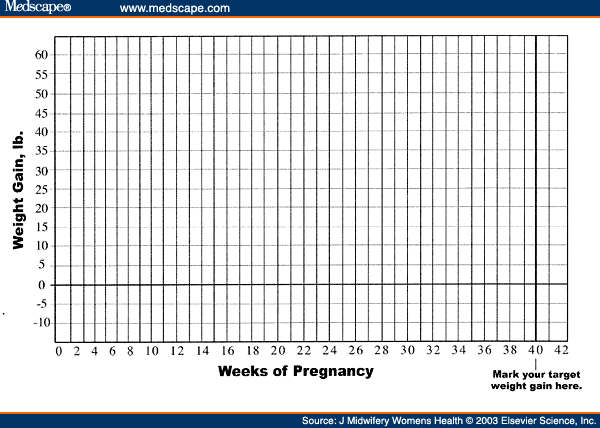


Most women do not gain much weight during the first trimester of pregnancy (between a half and 2 kilograms). Regardless of your BMI at the start of pregnancy, you can still have a healthy weight gain during pregnancy. The table below can be used as a guide to help you work out how much weight you should gain during your pregnancy. If this happens to you, you do not need to be concerned as long as you start to gain weight steadily in the second and third trimesters of your pregnancy. Some women even lose a small amount of weight. In the first trimester (first 12 weeks), most women do not need to gain much weight (usually less than 2 kg) – which is just as well for those who have morning sickness early in pregnancy. The colour of the cell indicates which recommendations are right for you. The number in the cell is your BMI (rounded to the nearest whole number). Find your height, then go across the chart till you are in the column headed by your weight (kg). The Kidspot website has an online tool that can help you calculate your BMI.Īlternatively, you can use the chart below to help you. Your BMI = 29 kg/m 2 = Overweight category (orange colour) You can ask your health practitioner to help you with this, especially if you do not have accurate scales at home.įor example: if you are 1.68 m tall and weigh 82 kg: This is your weight (measured) in kilograms divided by your height (measured) in metres squared. The amount of weight that you should gain during pregnancy depends on your pre-pregnancy body mass index (BMI). Not gaining enough weight during pregnancy can increase the chances of having a premature (preterm) birth, or a small for age baby.This may increase your risk of developing diabetes, heart disease and some cancers later in life. difficulty losing weight after your baby is born.This increases their risk of becoming obese in childhood and early adult life diabetes during pregnancy (gestational diabetes).high blood pressure with complications in pregnancy (pre-eclampsia).However, too much extra weight during pregnancy can increase your chances of:.


 0 kommentar(er)
0 kommentar(er)
